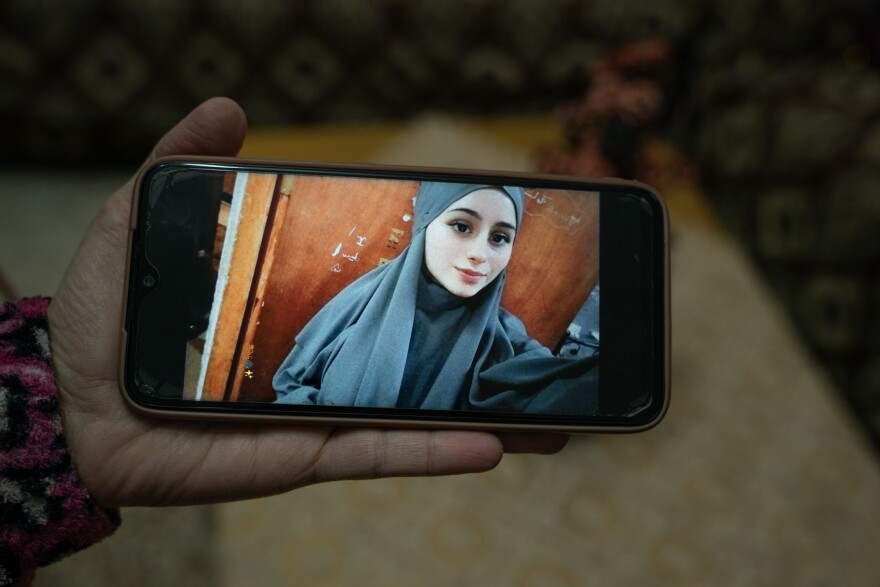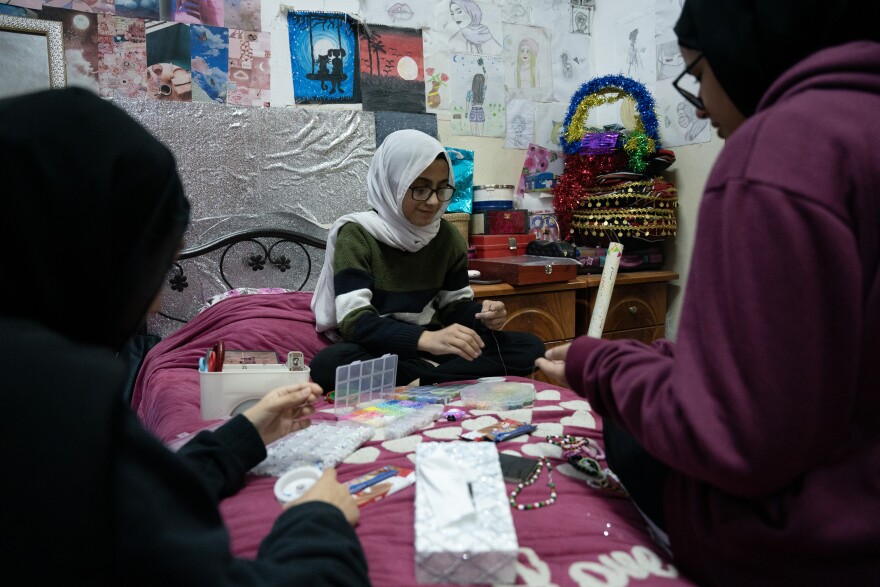LONDON and RAMALLAH, Israeli-occupied West Bank — Rimah Shahada's living room is filled with deflated balloons.
For the past week, she'd been preparing a homecoming celebration — with balloons, stuffed animals and welcome home cards — for her 17-year-old daughter, Aseel, who's been in an Israeli prison hospital since Nov. 11. Aseel was shot in the leg that day by Israeli soldiers, who said she lunged at them with scissors at a military checkpoint near the refugee camp where the Shahada family lives, in the Israeli-occupied West Bank.
The teenager is one of thousands of people arrested in the West Bank and East Jerusalem since Hamas' Oct. 7 attack on Israel, according to Israeli prison service figures, Palestinian officials and human rights groups. Many of them, like Shahada, are being held without charge or trial. Israel released about 240 Palestinian detainees and prisoners, in exchange for over 100 hostages freed by Hamas, as part of a weeklong truce that ended Friday.

"My hope's all gone now, sadly," says Rimah Shahada, 37. An NPR team had visited her home in the Qalandiya refugee camp near Ramallah last week, and reconnected with her by phone on Friday.
"We can't reach her, no one tells us anything about her," Shahada says of her daughter. "And now they're hitting Gaza again. God be with the martyrs in Gaza. I hope this war ends."
When Hamas militants stormed parts of southern Israel on Oct. 7, they killed about 1,200 people and took more than 240 hostages back to the Gaza Strip, according to Israeli officials. Since then, Israel's bombardment and invasion of Gaza have killed more than 15,000 Palestinians there, according to health officials in Gaza. Both Hamas and Israel say a prime aim is to free the prisoners or captives held by the other side. After the past week's swaps, Israel estimates 137 hostages are still held in Gaza.
The resumption of fighting between Israel and Hamas has dashed hopes of families like the Shahadas for the further release of the more than 10,000 Palestinians who remain in Israeli jails.
Aseel Shahada's name had been published on an Israeli government database of Palestinian prisoners eligible for release as part of the temporary truce with Hamas — which gave her family hope that her release was imminent. But only about 240 of the 350 names published were released before the exchanges stopped Friday.
Another woman from their refugee camp was among those released in the past week. Shahada's name was just after hers on the list. Her mother believes that if the truce had held for one more day, she would have been reunited with her daughter.
"The neighbor's daughter came out, but my daughter didn't," Rimah Shahada says.

Since Oct. 7, Israel has arrested 12 times more Palestinians than it has released as part of prisoner exchanges
Shahada's family says the teenager was upset about the Gaza war, but denies she was ever violent. They say they don't know how she could have gotten a weapon on her way home from school that day. They haven't been able to talk to her since the incident.
As of Friday, Israel was holding 7,677 Palestinians as what it deems security inmates, and another 2,873 Palestinians as administrative detainees — which means they can be held without charge, indefinitely. More than 1,500 of the arrests were made in November alone. These figures were sent to NPR by HaMoked, an Israeli nonprofit that offers legal aid to Palestinians living under occupation. It draws data directly from Israel's prison service.
The top Palestinian official overseeing prisoners' affairs, Qadoura Fares, who belongs to the Fatah party, Hamas' rival, says more than 3,000 Palestinians have been arrested in the West Bank and East Jerusalem in total since Oct. 7.
"The majority of them, 90% of them, are victims — not prisoners," Fares told NPR in an interview last week at his office in Ramallah. He says most of them are minors accused of nonviolent offenses.
"These are people Israel has decided to arrest for endangering Israeli security — without clarifying why, how, with whom," Fares says.
Fares accuses Israel of stepping up arrest raids during the latest Gaza war, in order to intimidate Palestinian communities and also have more detainees to negotiate with in prisoner exchanges.

Israel acknowledges stepping up arrest raids. It says it's targeting members of Hamas and other militant groups in order to thwart future attacks — especially during a time of war.
Hamas' ability to penetrate Israeli security — to kill and kidnap so many people on Oct. 7 — prompted many Israelis to ask whether militants had help from Palestinians elsewhere, including in the West Bank. Polls show wide support for Hamas in the West Bank, and there have been demonstrations there in support of the militant group.
The West Bank has been under Israeli military occupation since Israel captured the territory in the 1967 Mideast war. Under Israeli military law, Palestinian suspects can be held for up to eight days before seeing a judge — who can then classify them as administrative detainees, and extend their seizure indefinitely.
Before this war, the United Nations and human rights groups had criticized the application of military law to Palestinian civilians. They've also criticized the uptick in Israeli arrest raids since the war began.
"The scale of detentions and arrests [of Palestinians in the West Bank and East Jerusalem] since the 7th of October, and those without charges or trial, is unprecedented," Budour Hassan, an Amnesty International researcher based in the West Bank, tells NPR. "Palestinian detainees are telling us about humiliation and reprisals, even though they had nothing to do with the Oct. 7 attacks. It's a tactic of collective reprisal against all Palestinians."
The prison figures show that out of a total of at least 10,550 Palestinians in Israeli custody, nearly 40% of them are held without charge. Many of them are accused of nonviolent offenses.
Last month, Israel amended its counterterrorism law to make "consumption of terrorist materials" — reading or sharing content considered pro-Hamas online, for example — a new criminal offense. The law has been criticized by rights groups groups, including Article 19 and Adalah, as being ambiguous and far-reaching.
"It makes thoughts subject to criminal punishment ... and criminalizes even passive social media use," the human rights group Adalah says.
More than a third of Palestinians in Israeli custody have not been charged
That's what happened to Ayah Jalal Mohammed Tamimi.
The 20-year-old college student was arrested at her home in East Jerusalem on Oct. 9, two days after the Gaza war began, and accused of incitement — for a post on Instagram Stories, which quoted the Quran. (The post expired after 24 hours, so NPR was not able to verify Tamimi's account. She says it was simply a Quranic verse, posted without commentary.)
Tamimi spent 50 nights in jail before being released Tuesday, as part of the now-halted nightly exchanges of hostages and prisoners that were part of the temporary Israel-Hamas truce. She was never charged, and wasn't allowed a phone call from jail — not to a lawyer or her family, she says.
"They gave us plain bread. But we were always hungry, and it was cold," Tamimi tells NPR by phone from her home in East Jerusalem.

Last month, Israel's national security minister declared a three-month "prison emergency," which allows for prisoners to be given floor mattresses, rather than beds. The text of the declaration says that "many more detainees are expected to be absorbed in the near future in view of the state of war."
Another freed prisoner, 17-year-old Malik Mohammed Arafat Deeba, says he felt that change. Israeli prison conditions worsened after the war broke out, he says. Deeba was arrested in his East Jerusalem neighborhood last summer for stone-throwing — something he denies. He too was never charged, but was jailed for five months, before being released Tuesday as part of the now-halted truce.
"After the war began, the food got really bad, and they didn't give us enough of it," Deeba tells NPR by phone. "We were treated terribly. They cut us off from the world, we had no way of contacting our families."
His mother, Nihal Deeba, tells NPR she had been allowed to visit her son in jail until Oct. 7, when such visits were halted. She has another son, Arafat, age 20, who remains in Israeli custody. She'd been hoping the truce would last longer, and that he too might be freed.
"These are our children, our brothers and sisters," Nihal Deeba says. "I pray that all the prisoners are freed, and that the prisons are emptied."
Most of the Palestinians freed during the past week's exchanges were teenage boys. They also included several teenage girls and several dozen adult women. The gender of some of them is unclear, because their names could be male or female. Most of them are listed as being from the West Bank and Jerusalem.
None had been convicted of murder. Some have been accused or convicted of violence, including stabbings that injured Israeli security officers or civilians. Other offenses include stone-throwing, incitement and membership in what Israel considers a terrorist group.
Before the releases, Israel published lists of names of jailed Palestinians who were eligible to be part of the exchanges. It allowed Israeli citizens to petition their Supreme Court if they objected to any of the names. Some groups representing victims of terrorist attacks said they planned to appeal some names. But the court historically has not intervened to block such releases, and it did not do so this week.
Palestinian protest icon was among those released in prisoner exchanges
Among some 30 Palestinians released Wednesday night was Ahed Tamimi, now 22, who as a teenager became a symbol of Palestinian defiance to military occupation. In 2017, a video went viral showing Tamimi slapping and kicking Israeli soldiers in her home village in the West Bank. She pleaded guilty to assault charges, and has been in and out of Israeli prison since then. (Ahed Tamimi has no relation to Ayah Jalal Mohammed Tamimi.)

Ahed Tamimi had been arrested again last month, this time for an Instagram post. Israeli media say the post referred to Adolf Hitler and contained threats to "slaughter" Jews.
Her family says there are dozens of fake accounts under Tamimi's name, and that she did not post the message in question. The account it was posted on, which carried Tamimi's name and photo, has since been deleted.
BREAKING : Ahed Tamimi, just released from Israeli occupation jail, speaks about the horrific conditions in Israeli dungeons:
— sarah (@sahouraxo) November 30, 2023
“No food, no water, no clothes. We slept on the floor. They threatened to kill my father who is languishing in Israeli prison.” pic.twitter.com/YASneYGp4l
On her release, Tamimitold reporters that her Israeli jailers had threatened to hurt her family — including her father, who remains in another Israeli prison — if she spoke out about conditions in jail. She said there was little food or water, and that she had been forced to sleep on the prison floor.
With prisoner releases suspended, Palestinian families pray for another truce
Rimah Shahada fears the conditions her 17-year-old Aseel is enduring in an Israeli prison hospital. She says she has no information about her daughter's condition. But she says she has a feeling that somehow she'll see her daughter again.
"I hope all the detainees are released, and bring joy to their parents," Shahada says.

Her younger children, along with their cousins, have been making beaded friendship bracelets to give to Aseel upon her return.
"Praise be to God, I'm staying patient," their mother says.
Lauren Frayer reported from Ramallah and London. Fatima Al-Kassab reported from London.
Copyright 2023 NPR. To see more, visit https://www.npr.org.



